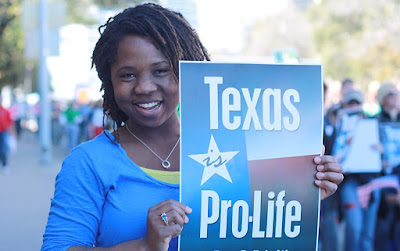A pro-life analysis of Obergefell v. Hodges
 |
| Above: Demonstrators await the Supreme Court’s decision on same-sex marriage |
On June 4, Ryan Bomberger of the Radiance Foundation called out LGBT rights leaders for their hypocritical support of abortion. In particular, he cited Lambda Legal’s statement that “reproductive freedom and LGBT rights have been inextricably linked both legally and politically. The ties between these rights are so strong that we really believe that a threat to one directly and profoundly impacts the other.”
On June 26, the U.S. Supreme Court released its opinion in Obergefell v. Hodges, declaring state laws against same-sex marriage void. The majority opinion was written by Justice Kennedy, who is widely recognized to be the Court’s swing vote on abortion. Notably, he did not cite any abortion cases. However, he did cite contraception cases, which were expanded upon to invent a “right” to abortion in Roe v. Wade. This has some pro-life leaders worried that Obergefell could be a bad decision for the preborn.
Since I am a lawyer, I share this summary for the benefit of pro-life legal advocates as well as the pro-life community at large. In my view, Obergefell is a mixed bag. It provides language the abortion industry can use. It also provides language the pro-life movement can use, and Justice Kennedy’s refusal to cite an abortion case is very encouraging. At the end of the day, though, Obergefell is unlikely to have a significant impact on abortion jurisprudence.
Justice Kennedy’s opinion opens with a discussion of the history of marriage:
From the beginning to their most recent age, the annals of human history reveal the transcendent importance of marriage. The lifelong union of a man and a woman always has promised nobility and dignity to all persons, without regard to their station in life. Marriage is sacred to those who live by their religions and offers unique fulfillment to those who find meaning in the secular realm. Its dynamic allows two people to find a life that could not be found alone, for a marriage becomes more than just the two persons. Rising from the most basic human needs, marriage is essential to our most profound hopes and aspirations.
He then turns to the personal stories of some of the plaintiffs: James Obergefell, whose partner died of ALS shortly after they traveled outside of their home state to marry; April De Boer and Jayne Rowse, who are jointly raising three children but cannot jointly adopt them; Ijpe DeKoe, who served in Afghanistan with the support of his stateside partner Thomas Kostura. “Their stories reveal that they seek not to denigrate marriage but rather to live their lives, or honor their spouses’ memory, joined by its bond.”
The opinion next discusses how opposite-sex marriage has changed over time, particularly with respect to the abandonment of “coverture,” a doctrine that effectively subsumed a wife’s legal identity under her husband’s. “These new insights have strengthened, not weakened, the institution of marriage. Indeed, changed understandings of marriage are characteristic of a Nation where new dimensions of freedom become apparent to new generations, often through perspectives that begin in pleas or protests and then are considered in the political sphere and the judicial process.”
This segues into a discussion of the LGBT rights movement, beginning with homosexual activity criminalized and homosexuality viewed as mental disorder, through the Supreme Court decisions in Bowers v. Hardwick, Romer v. Evans, Lawrence v. Texas, and finally the various same-sex marriage decisions in the lower courts.
Finally, the introductions are over and Justice Kennedy begins his discussion of the Due Process Clause. He cites the contraception cases, writing: “[T]hese liberties extend to certain personal choices central to individual dignity and autonomy, including intimate choices that define personal identity and beliefs. See, e.g., Eisenstadt v. Baird, 405 U.S. 438, 453 (1972); Griswold v. Connecticut, 381 U.S. 479, 484-486 (1965).”
In a passage that certainly rings true to me as a fighter against the injustice of abortion, Justice Kennedy declares:
The nature of injustice is that we may not always see it in our own times. The generations that wrote and ratified the Bill of Rights and the Fourteenth Amendment did not presume to know the extent of freedom in all of its dimensions, and so they entrusted to future generations a charter protecting the right of all persons to enjoy liberty as we learn its meaning. When new insight reveals a discord between the Constitution’s central protections and a received legal structure, a claim to liberty must be addressed.
“Applying these established legal tenets,” the Court decided Loving v. Virginia (allowing interracial couples to marry), Zablocki v. Redhail (allowing men behind on child support to marry), and Turner v. Safley (allowing prison inmates to marry).
Justice Kennedy states four reasons why same-sex marriage must receive the same type of Constitutional protection under the Due Process Clause:
(1) “[T]he right to personal choice regarding marriage is inherent in the concept of individual autonomy.”
That took restraint on Justice Kennedy’s part, because Casey contains a lengthy discussion of the Due Process Clause—which he authored. He could have had a grand time quoting himself. Instead, crickets. That leaves the door open for him to step back from Casey in the future and be a fifth pro-life vote. It’s no guarantee, of course. But if he had cited Casey, I would be writing a very pessimistic article. The fact that he didn’t gives me hope.
Ultimately, Obergefell is an opinion about the centrality of marriage in people’s lives. It is an opinion about “the hope of companionship,” commitment, family, and love.


Leave a Reply
Want to join the discussion?Feel free to contribute!